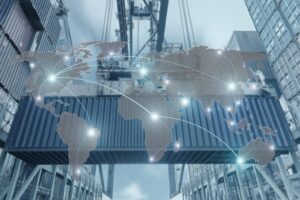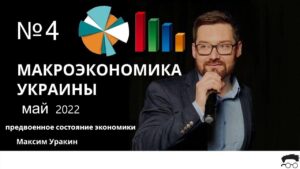
Ukraine expects zero rates for the export of goods to the UK to be set from June, First Deputy Prime Minister and Economy Minister Yulia Svyrydenko said after a meeting with British Secretary of State for International Trade Anne-Marie Trevelyan.
“We expect that already in early June, zero customs rates for the export of Ukrainian goods to the UK will begin to operate. This will allow Ukrainian exporters to increase the export of products,” the ministry’s press service quoted Svyrydenko as saying in a Telegram message on Friday.
“First of all, we are talking about such goods as flour, grain, dairy products, poultry meat and semi-finished products, honey, corn, sugar. As a result, we will attract additional volumes of foreign exchange earnings to the country, which will have a positive impact on macro-financial stability in the state,” the first deputy prime minister said.
During the meeting, the parties also discussed the situation with trade between the countries. In 2021, it has grown by 40%.
“In 2022, we can expect significant progress even despite the war,” the Ministry of Economy noted.
The Minister of Economy of Ukraine and the British Secretary of State for International Trade also discussed the possibility of British investments in Ukraine. Last year they reached $3 billion.
EXPORTS, GOODS, UK, ZERO RATES

UNIQA Life insurance company in January-March 2022 made insurance payments in the amount of UAH 6.63 million, which is 20.5% more than in the same period a year earlier.
According to the company’s website, during the reporting period, the company collected UAH 122.4 million, while for the same period a year earlier – UAH 213.9 million.
Equity capital as of March 31, 2022 amounted to UAH 259.02 million, assets – UAH 1.341 billion, actual solvency margin – UAH 256.2 million.
Pretax profit amounted to UAH 21.03 million.
UNIQA and UNIQA Life since 2006 have been part of UNIQA Group (Austria).

Foreign companies are again using underground gas storage (UGS) facilities in Ukraine, despite the war, although the volumes of such storage are still small due to gas shortages in Europe, Yuriy Vitrenko, Board Chairman of NJSC Naftogaz Ukrainy, has said.
“There are already foreign companies that, starting from April, under the conditions of war, still take risks and store gas in our storage facilities,” he said in an interview with Interfax-Ukraine.
The Naftogaz head recalled that in the first month of the war, Ukraine suspended such an opportunity, but then reopened storage facilities for nonresidents.
“So far, there are relatively small [volumes of storage by nonresidents]. The question is simply that there is a certain shortage of gas in Europe,” Vitrenko explained.
According to him, this trust is due to the fact that Ukraine is a reliable partner, unlike Russia.
“We just had a meeting of world economic leaders, they discussed energy security, and the Polish Minister of Energy, Anna Moskwa, says bluntly: look, we had contracts, Bulgaria had contracts, but the Russians simply do not fulfill them. Therefore, it is not worth taking into account any agreements and papers signed by Russia, unlike the agreements with Ukraine,” the Naftogaz Board Chairman said.
As reported, Ukraine actively offers European companies to use Ukrainian UGS facilities. The customs warehouse regime allows natural gas to be stored in UGS facilities in Ukraine for three years without paying taxes and customs duties during its further transportation from the country.
In January of this year, gas storage operator Ukrtransgaz, a subsidiary of Naftogaz, indicated that the number of nonresident companies in its customer portfolio had grown 8 times over the past three years to 111 companies representing 27 countries from three continents: Europe, North America and Asia.

Ukraine’s GDP in 2022 will fall by 45.1%, the World Bank predicts, recalling that before the Russian invasion, it expected the Ukrainian economy to grow by 3.2% this year.
The Ukrainian economy is expected to contract by 35% in 2022, although precise measures of the damage to the Ukrainian economy are impossible to obtain, according to the updated World Economic Outlook of the International Monetary Fund released.
The Ministry of Finance expects a fall in Ukraine’s GDP in 2022 ranging from 35% to 50%, Finance Minister Serhiy Marchenko has said.
Due to the war unleashed by Russia, Ukraine’s gross public debt will increase to 86.2% of GDP in 2022 after declining from 61% of GDP to 49% of GDP last year, this forecast is given by the International Monetary Fund (IMF).
The fall of the Ukrainian economy in 2022 will be about 33% according to the base scenario, in which the war will last for another month and a half at the most, Oleksandr Pecheritsyn, a leading analyst at Raiffeisen Bank (Kyiv), said.
The negative balance of Ukraine’s foreign trade in goods in January-March 2022 decreased by 40 times compared to the same period in 2021 – to $31.6 million from $1271.6 million.
The rise of consumer prices in Ukraine in March 2022 accelerated to 4.5% from 1.6% in February, while 1.3% in January and 0.6% in December, the State Statistics Service has said.
Inflation in Ukraine by the end of 2022 may exceed 20% due to the consequences of a full-scale war, but it will be controlled, the National Bank of Ukraine said.
Due to the war unleashed by Russia, Ukraine’s gross public debt will increase to 86.2% of GDP in 2022 after declining from 61% of GDP to 49% of GDP last year, this forecast is given by the International Monetary Fund (IMF).
The transport enterprises of Ukraine (excluding the territory of the Autonomous Republic of Crimea and Sevastopol, as well as part of the JFO zone) in 2021 increased transportation of goods by 3.3% compared to 2020 – up to 619.9 million tonnes.
About 23% of Ukrainian retailers’ outlets are closed, most of the non-operating facilities are in the entertainment segment, according to a survey by the Association of Retailers of Ukraine.
“As of April 20, some 11,744 stores out of 15,263 that were open at the time of the start of full-scale aggression were operating. That is, 23% less – 3,521 are closed. Compared to March, the situation is improving, since then the relative loss of retail was 29.4% – 4,481 store,” the association said. Fresh review dedicated to macro economic figures is available via link https://youtu.be/dwh7Q6aZZBA
Economic Monitoring’s Project Manager – PhD in Economics, Maksim Urakin

LLC “Zaporizhzhya Casting and Mechanical Plant” (ZLMZ), created on the basis of the production workshops of the department of the chief mechanic of PJSC “Zaporizhstal”, which is part of the Metinvest group, in record time, together with the Kryvyi Rih Mechanical Repair Plant, mastered the production of equipment for mining and processing plants (GOKov).
According to the company’s information, now ZLMZ will produce butars for mills for ore processing plants (ROF). Already in June, it is planned to produce seven such products for the company’s mining enterprises.
Andrey Khrapach, ZLMZ’s chief machining specialist, explained that earlier this equipment was purchased from third-party organizations.
“Butara is a conical drum that is used at mining and processing plants for grinding and sorting material. One product that we are currently working on will go to the Ingulets mining and processing plant. Previously, other enterprises supplied butars. But we are striving to develop new products. The product was developed together with colleagues from the Krivoy Rog Mechanical Plant in a very short time. Kryvyi Rih specialists developed a drawing, and we made a metal product. Two such drums are already in operation by miners, we received positive feedback,” Khramach said, quoted by the press service.
According to him, it took ZLMZ specialists less than three months from the idea to the final result. Two such butars of Zaporozhye production have already been installed at the ROF InGOK. ZLMZ produced two more similar butars for this enterprise. The plans are to increase the volume of production of these products. Currently, ZLMZ has already received an order and plans to manufacture seven more such products within a month.
EQUIPMENT, MASTERS PRODUCTION, MECHANICAL PLANT, MINING AND PROCESSING

Ukraine will host the European Karate Championship in 2026, the Ministry of Youth and Sports reported.
According to the press service of the Ministry of Sports, the decision to hold the continental championship in Ukraine was made at a meeting of the executive committee of the European Karate Federation (EKF), and Ukraine submitted the corresponding application in November 2021.
It is noted that this is the first time in the history of the European Karate Championships that it will be held in Ukraine.